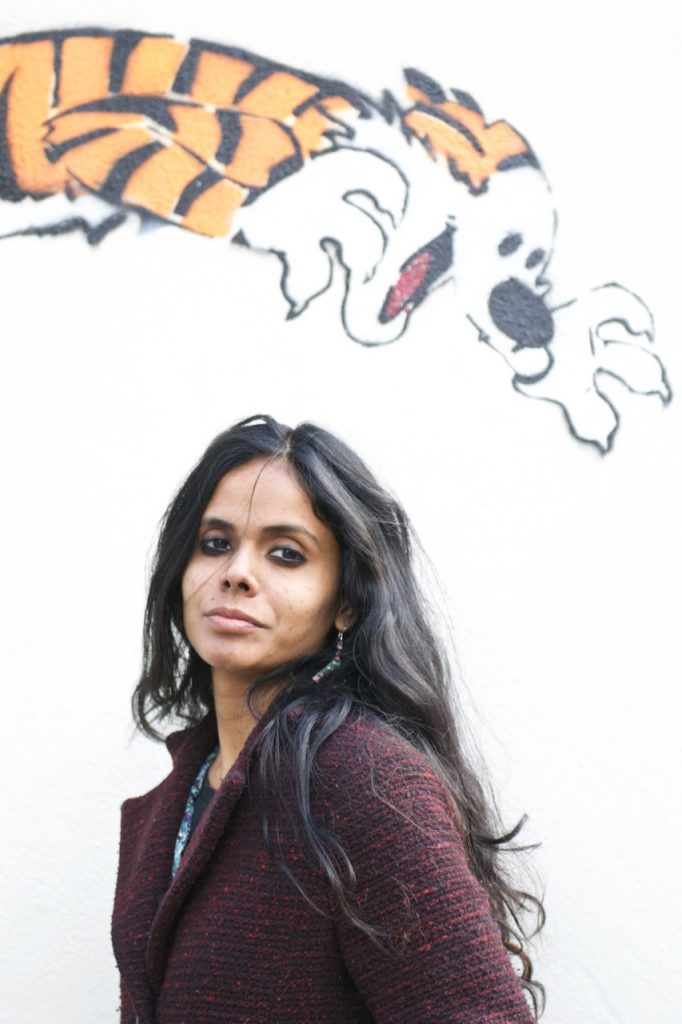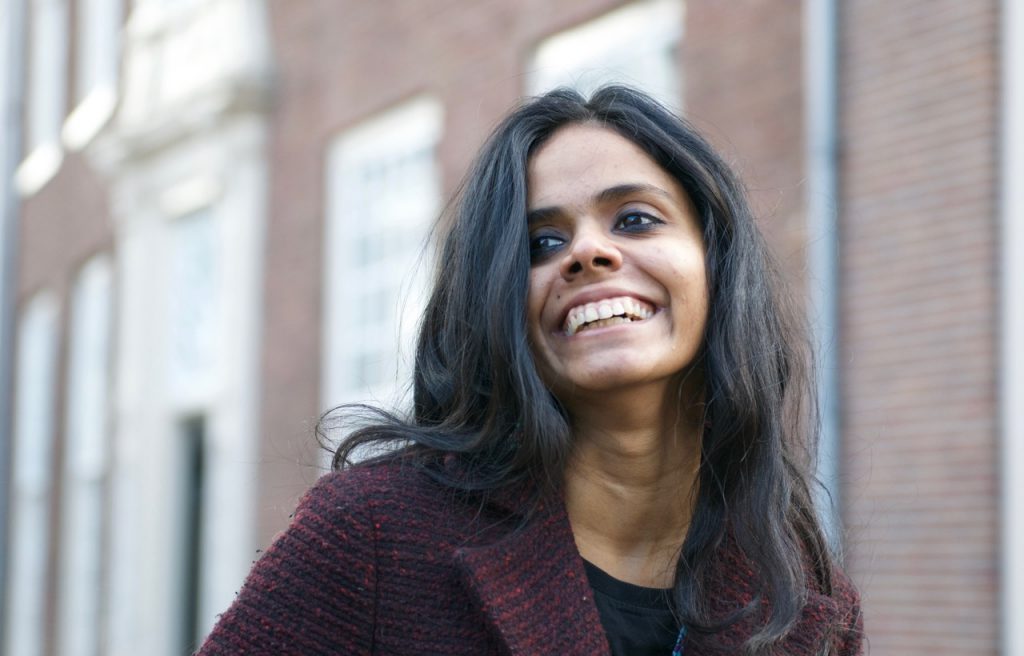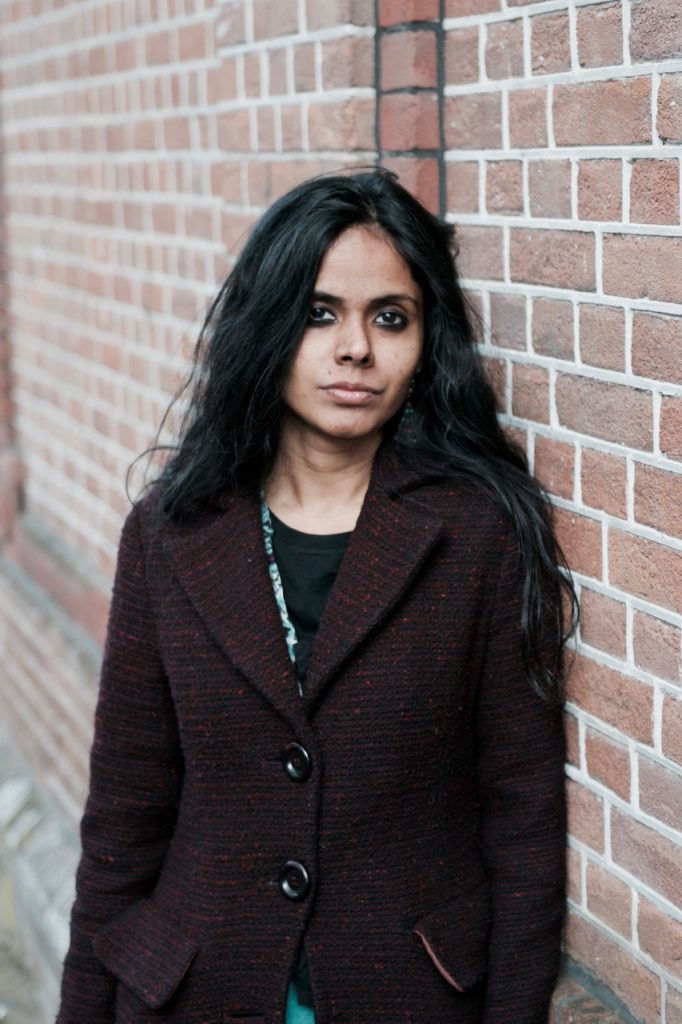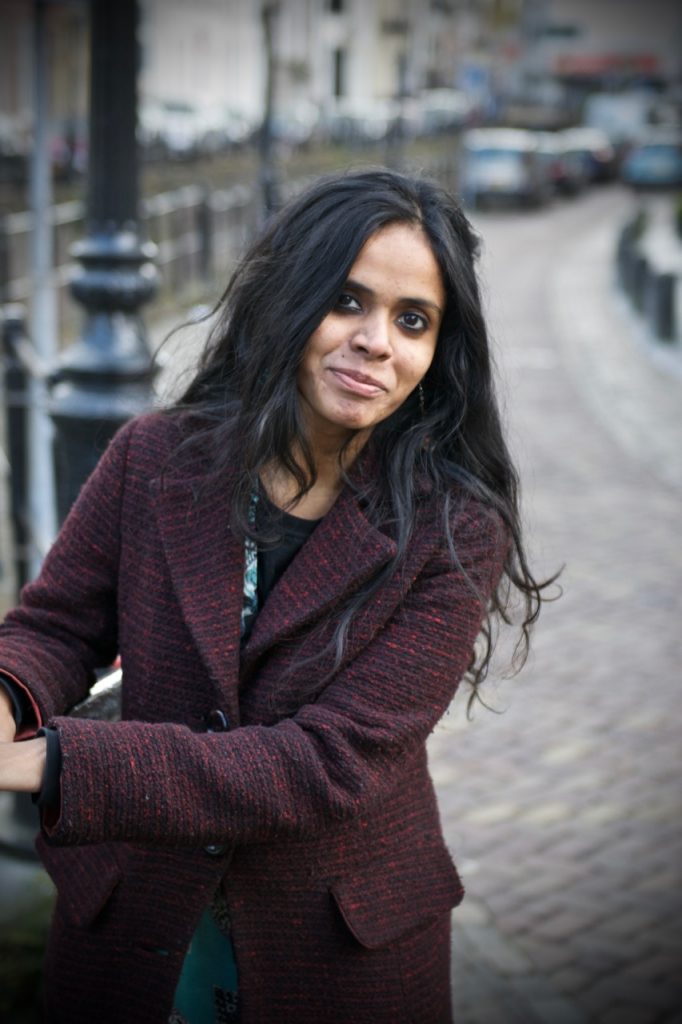Ze is klein en tenger, maar zo strijdbaar als een (Tamil) tijger. De Indiase schrijfster Meena Kandasamy (1984) breekt het liefst met alle conventies, en het woord is daarbij haar wapen.
Geen Bollywood
Wie op basis van het omslag en de auteursnaam denkt dat De zigeunergodin een zoetsappige ‘Bollywoodroman’ is, komt bedrogen uit. Meena Kandasamy’s roman gaat over een waargebeurde massamoord in Tamil Nadu, waar op eerste kerstdag 1968 in het dorp Kilvenmani een groep van vierenveertig oude mannen, vrouwen en kinderen levend werd verbrand. Aan de hand van feiten, verhalen en politierapporten reconstrueert Kandasamy de gebeurtenissen, maar stelt daarnaast de onmogelijkheid een roman te schrijven over zo’n gruwelijke, waargebeurde tragedie centraal. Ze speelt met vorm en metafictie. Het resultaat is een opmerkelijke, tragisch-speelse roman, een wervelwind als de schrijfster zelf, die afgelopen weekend te gast was op het International Literature Festival Utrecht. Kandasamy spreekt alsof de duivel haar op de hielen zit, zo rap en vurig – de noodzaak is groot en ze lijkt geen minuut te willen verspillen. Als klein kind vergezelde ze haar vader bij politieke bijeenkomsten, en sinds haar zeventiende is ze activiste. Ze schrijft essays en artikelen, poëzie en romans, en verschijnt geregeld op televisie om haar uitgesproken mening te geven.

Ook haar debuutroman De zigeunergodin is een politiek boek en bevat kritische noten over onder meer de ongelijkheid binnen de Indiase maatschappij ten gevolge van het kastestelsel, waardoor mensen die als een dubbeltje worden geboren nooit een kwartje zullen worden.
‘Onze maatschappij is sterk verdeeld. Vrouwen worden er niet gerespecteerd, niet als gelijke behandeld. Ik word nergens voor de volle honderd procent gewaardeerd. Ik spreek me uit tegen het kastestelsel, praat over vrouwenemancipatie, seksualiteit. Voor Tamil-mannen voldoe ik niet aan het beeld van de mooie, gehoorzame Tamil-vrouw, dus zij zien me als een slecht voorbeeld. Feministen waarderen me weliswaar om mijn uitgesproken mening over vrouwenrechten en mannelijke overheersing, maar als ik ze aanspreek op het feit dat ze geen afstand nemen van het kastestelsel – terwijl dat bepaalt met wie ze mogen trouwen, van wie ze mogen houden – zijn ze daar weer niet blij mee. Want ze willen wel gelijk zijn aan mannen, maar niet de privileges inleveren die horen bij hun hoge kaste. Kortom, voor geen enkele groep kan ik het echt goed doen. Daarom voel ik me het beste als schrijver, omdat ik daar kan doen wat ik zelf wil. Bij het schrijven van essays en artikelen richt ik me op de medemens en de maatschappij. Het schrijven van fictie doe ik meer voor mezelf, al schrijf ik over datgene waarvan ik vind dat het aan de wereld moet worden verteld.’
Vrouwen worden geacht over liefde en hun verlangens te schrijven, over relaties en familie, zegt Kandasamy, maar niet over hardcore politiek. En dus wilde ze een politiek boek schrijven, lacht ze. ‘De algemene benadering van mensen uit de onderklasse, arme of onderdrukte mensen, is dat ze lijden ten gevolge van het systeem. Deze gedachte wekt compassie op en dat is mooi. Maar literatuur moet een stap verder gaan. Laten zien dat mensen ook terugvechten en verzet bieden, en dat daarin grote schoonheid verscholen ligt. Daardoor voel je niet alleen compassie voor die mensen, maar verandert ook je perspectief en word je uitgenodigd hen meer van binnenuit te gaan begrijpen en deel te nemen aan hun strijd. Romans moeten niet alleen over het individu gaan, vind ik. Het gaat in mijn roman dan ook vooral om een gemeenschap, een dorp. Voor mij is het dorp de eigenlijke hoofdpersoon.’

Een naald in de banaan
Fictie kan bijdragen aan verandering, meent Kandasamy, hoe klein die ook begint. ‘Fictie stopt een naald in de banaan, zoals wij dat in India zouden noemen. Protestpoëzie is als een klap in je gezicht; romans zijn subtieler. Het verhaal is je wapen: het verleidt je om bij jezelf naar binnen te kijken en over jezelf na te denken. Mijn volgende roman gaat bijvoorbeeld over huiselijk geweld. Stel dat een mannelijke lezer denkt: ach, vrouwen klagen altijd over mannen, dan zou hem dat inzicht kunnen bieden in zijn vooroordelen.’
Ze neemt een haastige slok koffie voordat ze verdergaat. Als schrijfster speelt ze niet alleen graag met vooroordelen en maatschappijkritiek, vertelt ze, maar ook met de vorm van literatuur zelf. In India is de roman – een betrekkelijk nieuwe literaire vorm – nog vrij traditioneel; lineair van structuur, eenduidig in perspectief en plot. Metafictie, het thematiseren van de literatuur of de literaire vorm op zich, is een onbekend verschijnsel. In De zigeunergodin neemt Kandasamy soms nadrukkelijk een hoger standpunt in, als schrijver van de roman.
‘Ik wil experimenteren met de mogelijkheden. Als dichter schrijf ik ook geen twee gedichten in hetzelfde register. Misschien is dat wel mijn vooroordeel, maar ik denk dat alles al weleens is gezegd. Je kunt alleen veranderen hóé het wordt gezegd. Meestal zijn mannen degene die experimenteren – zoals vroeger James Joyce –, niet de vrouwen. Dat wilde ik doorbreken.’

Conventies op elk vlak moeten worden doorbroken, vindt ze, want die lijden al snel tot normen of zelfs dogma’s: alles wat afwijkt, wordt niet geaccepteerd. Ook binnen het boekenvak is dat in haar ogen het geval, want uitgevers willen vooral boeken met een duidelijk stempel, die goed kunnen worden verkocht. Dat leidt ertoe dat er meer van hetzelfde verschijnt en dat romans en schrijvers die een ander geluid laten horen, snel buiten de boot vallen.
‘Lezers zullen dit nooit lezen, die houden niet van experimentele romans, zeggen ze dan. Het boek van Eimear McBride, Een meisje is maar half af, wilde geen grote mainstream uitgever hebben, terwijl het een belangrijk en vernieuwend boek is. Pas toen het boek na verschijning bij een kleine uitgeverij prijzen won, werd het met andere ogen bekeken. Waarom worden zulke boeken niet bij gevestigde uitgeverijen uitgebracht? Ze bevinden zich nooit in de voorhoede, omdat ze denken dat de lezer achterlijk is. Daarom zou het goed zijn als er veel meer vernieuwende romans geschreven worden, want één boek verandert de kapitalistische boekenindustrie niet.’
Meena Kandasamy, De zigeunergodin, Atlas Contact.
Dit mag dan een roman zijn die zich op het Indiase platteland afspeelt, maar verwacht niet dat er voor de authentieke toets over elke bladzijde een kudde waterbuffels wandelt. Ook de enthousiaste moeders die met zout en gedroogde rode pepers in hun handen ronddraaiende gebaren boven uw hoofd maken en u dan vragen drie keer in hun handen te spugen om het boze oog te verjagen zijn op mijn verzoek thuisgebleven, want ik wil u niet kwijtraken aan nostalgie of exotica. De rinkelende belletjes van de ossen hadden muziek aan deze regels kunnen toevoegen, maar die heb ik het zwijgen opgelegd opdat u in stilte en vrede de verhaallijn kunt volgen.

